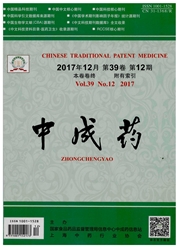

 中文摘要:
中文摘要:
目的研究栀子苷在水溶液及热毒宁注射液(栀子、青蒿、金银花等)中,于不同pH、温度环境下的降解规律。方法采用HPLC法测定栀子苷在不同pH(1~13)、温度(60,70,80,90℃)中的变化,以化学动力学方法计算其降解动力学参数。结果栀子苷降解反应符合一级动力学方程,降解速率随pH及温度的升高而增加,根据Arrhenius方程,计算得到实验条件下栀子苷在水溶液中及热毒宁注射液中的降解活化能(Ea)分别为128.08kJ/mol,79.19kJ/mol。结论栀子苷对强碱及高温比较敏感,提示热毒宁注射液生产工艺应在低温和近中性pH值溶剂中生产。
 英文摘要:
英文摘要:
AIM To study the degradation law of geniposide in aqueous solution and in Reduning Injection (Gardeniae Fructus , Artemisiae annuae Herba , Lonicerae japonicae Flos , etc. ) under different pH values and temperatures. METHODS The contents of geniposide under different pH values ( 1 - 13 ) and temperatures (60, 70, 80 and 90 ℃ ) were determined by HPLC. The kinetic parameters of geniposide was evaluated using the chemical kinetics. RESULTS The reaction of geniposide under different pH values and temperatures accorded with the first-order kinetics. The degradation rate increased with the increase of pH value and temperature. According to the arrhenius equation, the activation energy (Ea) in aqueous solution and Reduning Injection were 128.08 kJ/mol and 79. 19 kJ/mol, respectively. CONCLUSION The fact that geniposide is sensitive to strong alkaline and high temperature indicates that the production process of Reduning Injection ought to stay within the low temperature extraction in near neutral solution.
 同期刊论文项目
同期刊论文项目
 同项目期刊论文
同项目期刊论文
 期刊信息
期刊信息
